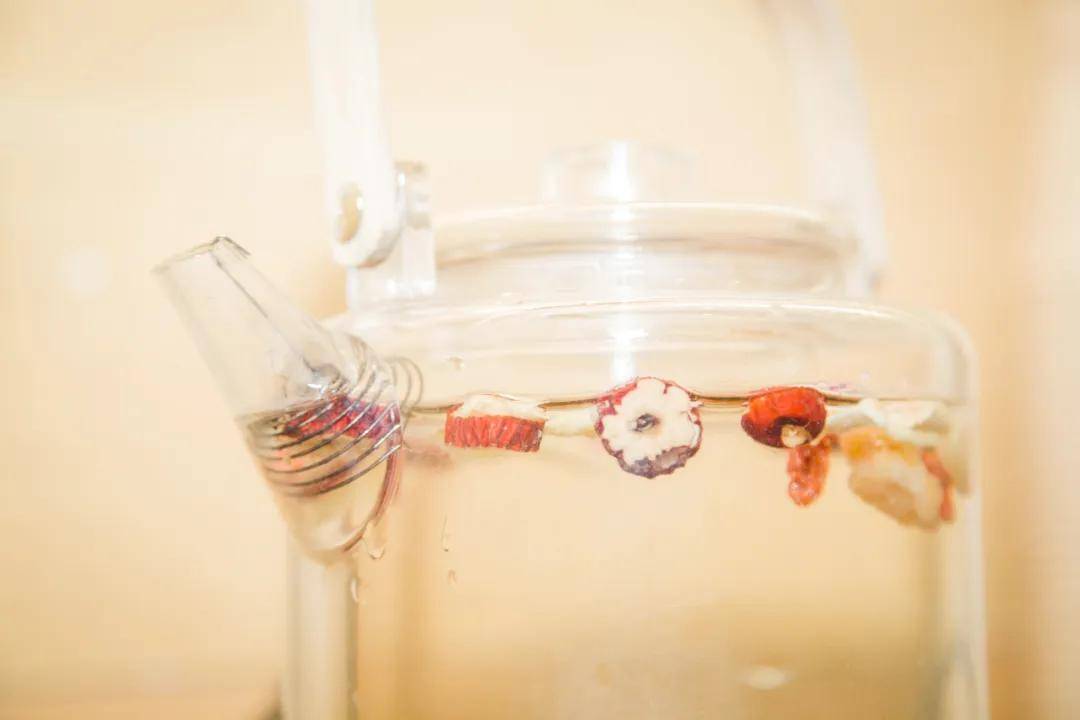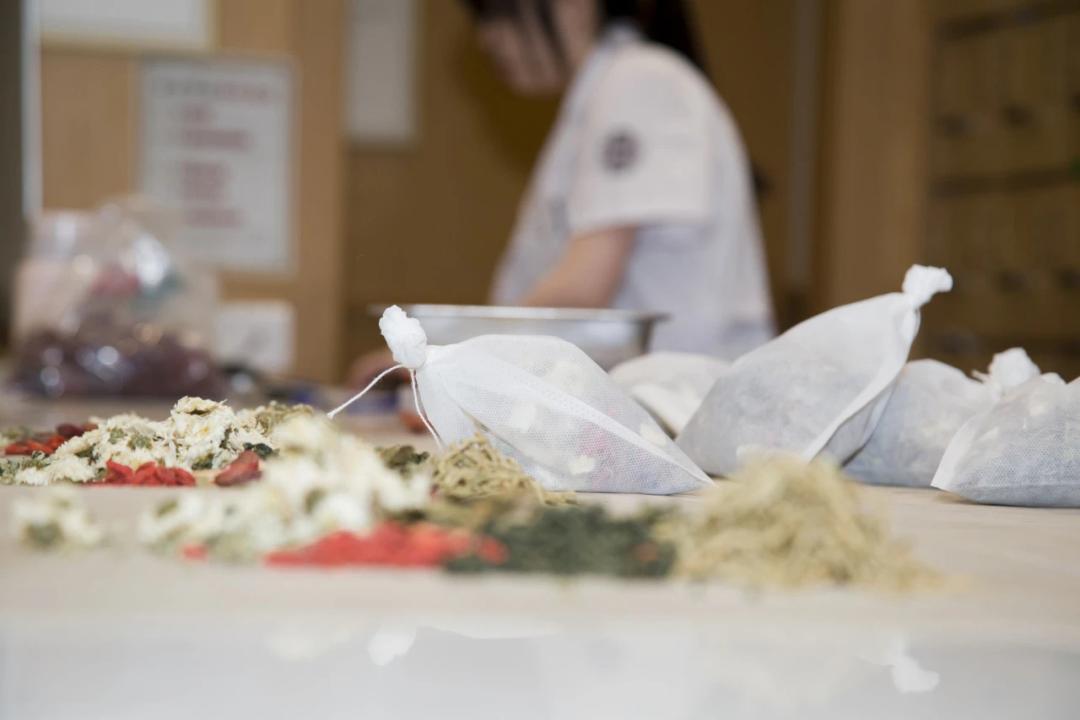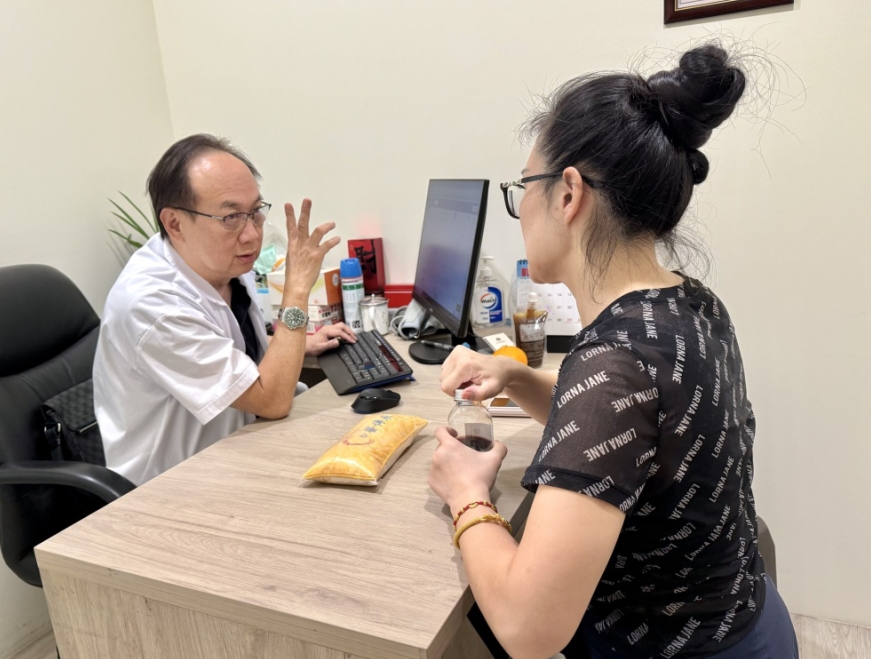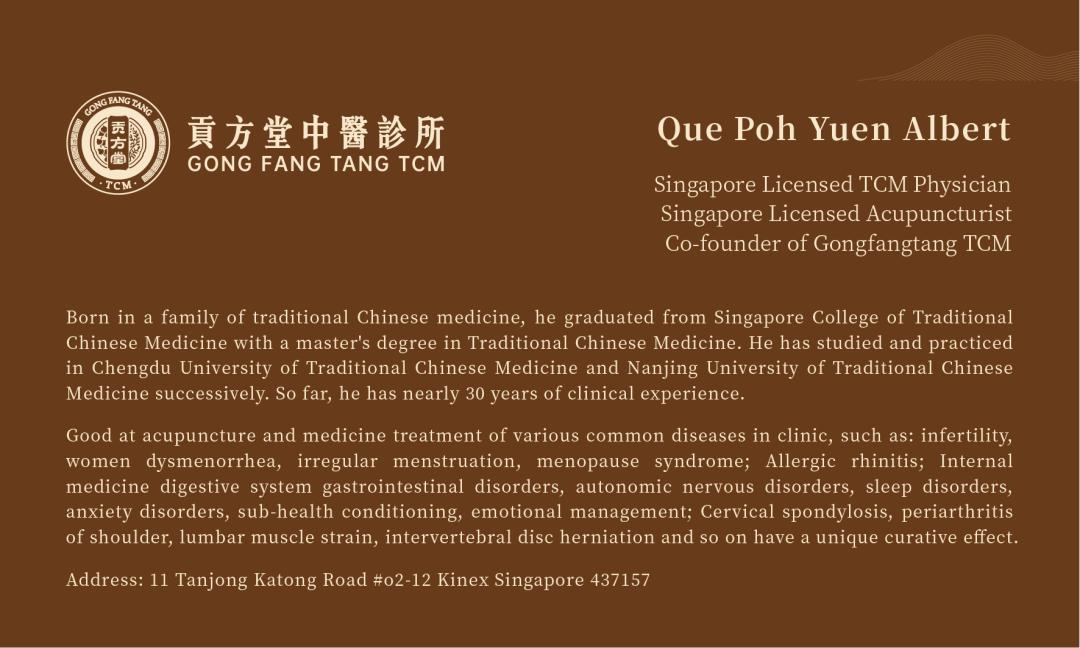- Physicians
- Clinics
- TCM
- Western GP
-
Fees
-
Deals & Privileges
- About & Resources
- Contact Us
Uterine fibroids, the most common benign tumors of the female reproductive system, can be considered a "silent burden" for modern women. Acting like a "time bomb," they cause significant concern for many. Statistics indicate that approximately 20% of women over 30 suffer from uterine fibroids. How can Chinese medicine regulate them to make them disappear?

Why Are Women Prone to Uterine Fibroids?
According to TCM gynecology expert Dr. Que Poh Yuen Albert from Singapore's Gong Fang Tang TCM, uterine fibroids fall under the categories of "Zheng Jia" (abdominal masses) or "Shi Jia" (stone-like masses) in Traditional Chinese Medicine. Their formation is not sudden; it results from the combined action of internal factors (constitution) and external factors (lifestyle), leading to obstructed Qi and blood flow in the Uterus (Bao Gong), where "blood stasis" (Yu Xue) congeals into lumps.
"Blood Stasis" is the Core Pathological Product:
Qi Stagnation Leads to Stasis: Modern women face immense pressure (work, family), leading to emotional constraint and Liver Qi stagnation. Qi is the commander of blood; when Qi stagnates, blood flow becomes sluggish, eventually forming stasis over time.
Cold Congealing Blood Stasis: Indulging in cold drinks (iced milk tea, ice cream), wearing midriff-baring clothes, or prolonged exposure to air-conditioned environments allows cold pathogens to invade the Uterus. Blood congeals with cold, like a river freezing over, forming stagnant blockages.
Heat Scorching Blood Stasis: Excessive consumption of spicy, drying, or rich foods, or prolonged mental stress transforming into fire, "scorches" the blood, making it thick and stagnant.
Deficiency Leads to Blood Stasis: Chronic illness, postpartum maladjustment, or multiple miscarriages damage the Chong and Ren vessels and Qi-Blood. Deficient Qi lacks the strength to propel blood (Qi deficiency blood stasis), or Yin deficiency leads to scanty blood and sluggish vessels (Yin deficiency blood stasis).
"Phlegm-Dampness" is a Key Accomplice: The Spleen governs the transformation and transportation of fluids. Dietary irregularities (craving greasy, sweet, rich foods), excessive worry, and lack of exercise damage the Spleen and Stomach. Spleen deficiency leads to internal accumulation of dampness, which congeals into phlegm. Phlegm-dampness colludes with blood stasis, forming phlegm-stasis bind, which more easily forms lumps and makes fibroid texture tougher.
"Deficiency of Healthy Qi (Zheng Qi)" is the Internal Foundation: Innate constitutional weakness, poor postnatal nourishment, or excessive fatigue depletes healthy Qi (Qi, Blood, Yin, Yang). With deficient healthy Qi, the body's ability to clear stasis and phlegm-turbidity diminishes, allowing fibroids to grow and persist.
Summary: The disease location is the Uterus (Bao Gong), the core pathology is blood stasis, often complicated by Qi stagnation, phlegm-dampness, cold/heat, or deficiency. Modern women's common issues like high stress, preference for cold, prolonged sitting, and dietary irregularities act as "catalysts" accelerating fibroid formation.
What Are the Feelings and Symptoms of Uterine Fibroids?
When uterine fibroids are present, the body often sends "signals." Abnormal menstruation is the most common symptom, including increased menstrual flow, prolonged periods, or even irregular vaginal bleeding. Some patients feel lower abdominal distension, pain, or can feel a mass in the lower abdomen. Pressure on surrounding tissues may cause frequent urination, urgency, difficulty urinating, or constipation. Long-term heavy menstrual bleeding can also lead to anemia, manifesting as pale complexion, dizziness, and fatigue.

How Does Chinese Medicine Regulate Uterine Fibroids?
Addressing the core pathogenesis of uterine fibroids – "internal retention of blood stasis" – Physician Dr. Que Poh Yuen Albert highly recommends the classic formula Guizhi Fuling Tang (Cinnamon Twig and Poria Pill) from the ancient medical sage Zhang Zhongjing's "Essentials from the Golden Cabinet" (Jin Gui Yao Lue). This formula, clinically validated for millennia, has balanced properties: it dispels stasis without harming healthy Qi and dissolves masses without damaging vitality. It is the foundational and preferred formula for treating uterine fibroids and other gynecological masses.
Guizhi Fuling Tang consists of 6 herbs: Gui Zhi (Cinnamon Twig), Fu Ling (Poria), Gan Cao (Licorice Root), Mu Dan Pi (Tree Peony Bark), Tao Ren (Peach Kernel), and Chi Shao (Red Peony Root).
Gui Zhi (Cinnamon Twig): Warms and unblocks the channels, moves Qi and invigorates blood. Acts as the channel unblocker, restoring smooth Qi and blood flow.
Tao Ren (Peach Kernel) & Mu Dan Pi (Tree Peony Bark): Responsible for breaking blood stasis and promoting blood circulation, aiding the expulsion of internal stagnant blood.
Chi Shao (Red Peony Root): Clears heat and cools blood, preventing prolonged stasis from triggering deficient fire.
Fu Ling (Poria): Drains dampness, promotes urination, fortifies the Spleen, and calms the Spirit. Strengthens Spleen function and enhances the body's fluid metabolism.
Gan Cao (Licorice Root): Harmonizes the other herbs, boosts Qi and tonifies the middle, dispels phlegm and stops cough, detoxifies, and relieves spasmodic pain.
The six herbs work synergistically: activating blood and dispelling stasis, unblocking channels, fortifying the Spleen, and eliminating dampness. Together, they achieve the effect of invigorating blood, dispelling stasis, and dissolving masses and nodules – naturally eliminating nodules, fibroids, and cysts.
Modifications and Ingenious Uses:
Pronounced Qi Stagnation (hypochondriac distension, frequent sighing): Add Chai Hu (Bupleurum Root) 9g, Xiang Fu (Cyperus Rhizome) 12g to soothe the Liver and regulate Qi.
Severe Blood Stasis (dark purple tongue, many stasis spots, severe dysmenorrhea): Add San Leng (Burreed Rhizome) 9g, E Zhu (Zedoary Rhizome) 9g to break blood and expel stasis, OR Dan Shen (Salvia Root) 15g, Yi Mu Cao (Motherwort Herb) 30g to enhance blood-moving and menstrual-regulating power.
Exuberant Phlegm-Dampness (overweight, thick greasy coating, excessive leucorrhea): Add Cang Zhu (Atractylodes Rhizome) 12g, Chen Pi (Tangerine Peel) 9g, Ban Xia (Pinellia Rhizome) 9g to dry dampness and transform phlegm, OR Chao Yi Yi Ren (Stir-fried Coix Seed) 30g to fortify the Spleen and drain dampness.
Hard, Difficult-to-Resolve Fibroids: Add Mu Li (Oyster Shell) 30g (decoct first), Bie Jia (Turtle Shell) 15g (decoct first) to soften hardness and dissipate masses.
Excessive Menstrual Flow, Continuous Spotting: Add Chao Pu Huang (Stir-fried Cattail Pollen) 12g (wrapped in decoction), Qian Cao Tan (Charred Madder Root) 12g, Wu Zei Gu (Cuttlefish Bone) 15g to transform stasis and stop bleeding.
Kidney Deficiency with Lumbar Soreness:
(Kidney Yang Deficiency with cold aversion): Add Yin Yang Huo (Epimedium Herb) 12g, Ba Ji Tian (Morinda Root) 12g.
(Kidney Yin Deficiency with tidal heat): Add Nü Zhen Zi (Ligustrum Fruit) 15g, Han Lian Cao (Eclipta Herb) 15g.
Qi and Blood Deficiency (fatigue, pale complexion): Add Huang Qi (Astragalus Root) 30g, Dang Gui (Chinese Angelica Root) 12g, Ji Xue Teng (Spatholobus Stem) 30g to boost Qi, nourish blood, and invigorate blood.
Cold Pain in Lower Abdomen: Add Ai Ye (Mugwort Leaf) 9g, Xiao Hui Xiang (Fennel Seed) 6g to warm the channels and relieve pain.

Medical Case Study
Patient: Ms. Guo, 30 years old.
Chief Complaint: Uterine fibroids discovered 2 years prior, progressively enlarging. Over the past 6 months, significantly increased menstrual flow with large amounts of dark purple clots; periods prolonged to about 10 days; accompanied by severe dysmenorrhea (requiring painkillers), cold pain and distension in the lower abdomen. Generally averse to cold, with lumbar soreness. Ultrasound showed: Intramural fibroid on the posterior uterine wall, approx. 4.3cm x 4.0cm. Previously took Western medicine (e.g., Mifepristone) with poor effect.
Initial Consultation: Tongue pale purple-dark, thin white coating, stasis spots on the edges; pulse deep and choppy.
Diagnosis: Zheng Jia (Abdominal Mass - Pattern of Cold Congealing and Blood Stasis).
Treatment Principle: Warm the channels and dissipate cold; invigorate blood and dispel stasis; dissolve masses and dissipate nodules.
Prescription: Modified Guizhi Fuling Tang.
Formula: Gui Zhi (Cinnamon Twig) 12g, Fu Ling (Poria) 20g, Tao Ren (Peach Kernel) 12g, Chi Shao (Red Peony Root) 15g, Dan Pi (Tree Peony Bark) 12g, San Leng (Burreed Rhizome) 10g, E Zhu (Zedoary Rhizome) 10g, Ai Ye (Mugwort Leaf) 10g, Xiao Hui Xiang (Fennel Seed) 6g, Wu Zei Gu (Cuttlefish Bone) 18g, Chao Pu Huang (Stir-fried Cattail Pollen) 12g (wrapped in decoction), Huang Qi (Astragalus Root) 30g.
Medical Advice: Avoid raw, cold, and chilly foods (especially during menstruation); keep the abdomen warm; avoid overexertion; maintain a smooth emotional state.
Second Consultation: After 1 month of medication, menstrual flow reduced by about 1/3, clots significantly decreased, dysmenorrhea lessened (able to stop painkillers), period shortened to 7 days, cold pain sensation in lower abdomen reduced. Prescription adjusted and continued.
Outcome: After 2 months of medication, menstrual flow basically returned to normal (noticeable reduction in sanitary pad usage), mild dysmenorrhea, period ended in 6 days. Follow-up ultrasound showed fibroid shrunk to 3.8cm x 3.2cm. After 4 months of medication, menstrual cycle, flow, and duration all normalized, dysmenorrhea disappeared, lumbar soreness and cold aversion improved. Follow-up ultrasound showed the fibroid further shrunk to 2.5cm x 2.0cm! The patient was very satisfied with the results and continued consolidation therapy to stabilize the efficacy.